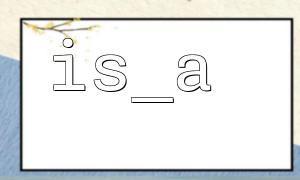The is_a() function in PHP is used to determine whether an object belongs to a certain class or is an instance of a subclass of that class. Its basic usage is as follows:
is_a(object $object, string $class_name, bool $allow_string = false): bool
Starting from PHP 5.3.0, is_a() added a third parameter $allow_string. This parameter determines whether the function treats the first argument as a class name string and performs the check accordingly when the first argument is a string.
Before PHP 5.3+, is_a() only accepted objects as the first parameter, and passing a string (class name) would trigger warnings or errors. PHP 5.3+ introduced the third parameter, allowing class name strings to be passed for checking. This is very useful in scenarios like dynamically checking if a class inherits from another without needing to instantiate an object.
For example:
<?php
class ParentClass {}
class ChildClass extends ParentClass {}
<p>echo is_a(new ChildClass(), 'ParentClass'); // Output: 1 (true)<br>
echo is_a('ChildClass', 'ParentClass'); // Warning, not supported before PHP 5.3+<br>
echo is_a('ChildClass', 'ParentClass', true); // Output: 1 (true)<br>
?><br>
Here, setting the third parameter to true allows the first argument to be the string 'ChildClass', correctly determining whether the class is a subclass of 'ParentClass'.
Avoid Instantiating Objects
In some cases, you don’t want to instantiate objects but just want to check class inheritance. Allowing a string argument avoids unnecessary resource consumption.
More Flexible Code
Allowing dynamic class name checks makes code more versatile, especially when dealing with dependency injection and factory patterns, which often handle classes by their name strings.
Compatibility and Clarity
Explicitly setting the third parameter to true makes the code intent clear, preventing potential errors caused by default behavior.
<?php
class Animal {}
class Dog extends Animal {}
<p>// Object check<br>
$dog = new Dog();<br>
if (is_a($dog, 'Animal')) {<br>
echo "Dog is a subclass of Animal\n";<br>
}</p>
<p>// String check, recommended to pass true in PHP 5.3+<br>
if (is_a('Dog', 'Animal', true)) {<br>
echo "The class represented by string 'Dog' is a subclass of Animal\n";<br>
}<br>
?><br>
PHP 5.3 added the third parameter $allow_string to the is_a() function, defaulting to false.
If passing a string without setting this parameter to true, warnings or errors will occur.
It is recommended to explicitly set the third parameter to true when using is_a() in PHP 5.3+ to support class name string checking.
This makes the code safer, more flexible, and avoids unnecessary object instantiation.














